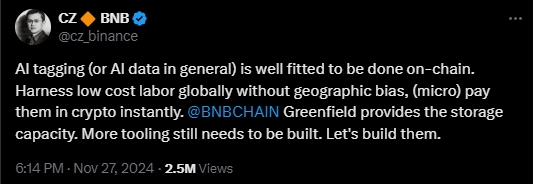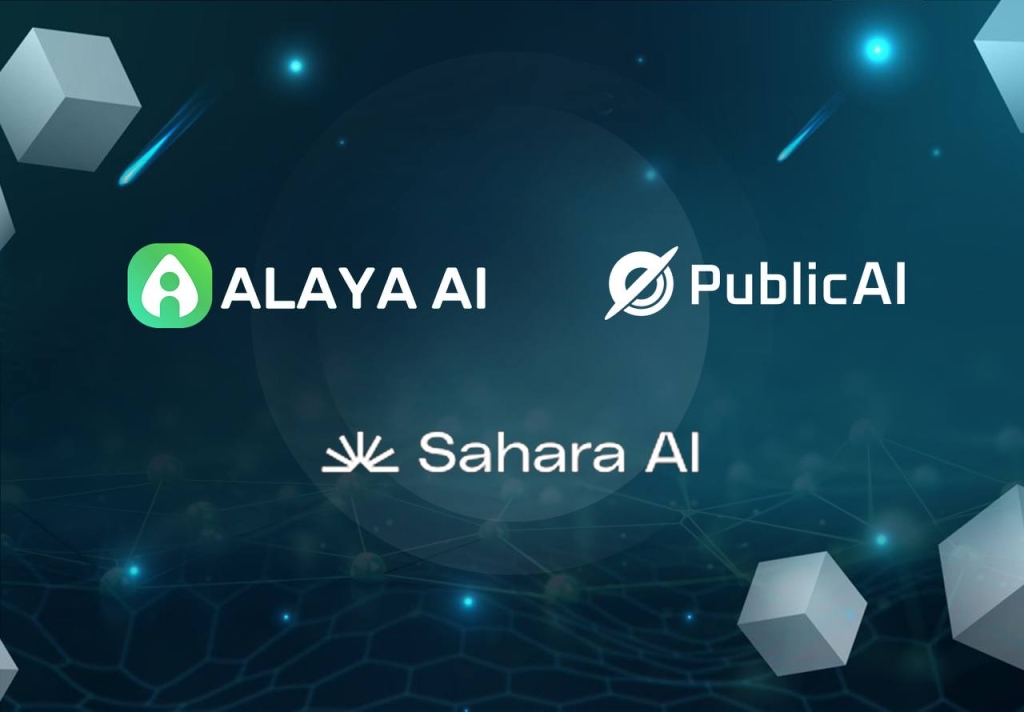The rapid advancement of AI technologies has unveiled immense potential for global industries, with CZ (Changpeng Zhao)’s recent tweet

(https://x.com/cz_binance/status/1861715172429090959) sparking widespread discussions about the integration of AI and blockchain. This cross-technology synergy is disrupting how training data for AI is produced. High-quality data lies at the core of AI advancements, as the performance of AI models is directly tied to the quality of labeled data used for training and optimization. Against this backdrop, Web3 technologies are redefining the traditional data annotation industry with decentralized frameworks and economic incentive mechanisms. This article explores the current state and challenges of data annotation, dives into the development paths of prominent Web3 annotation projects (Sahara AI, Alaya AI, Public AI, etc.), and envisions their future potential.
Current Landscape of the Data Annotation Industry: High Demand, Complex Challenges
The success of AI hinges on vast amounts of annotated data for training and validation. However, this process is fraught with complexity and labor intensity. Key characteristics of the data annotation industry today include:
1. Soaring Demand and Supply Imbalance
With the proliferation of deep learning technologies, fields like computer vision, natural language processing (NLP), and speech recognition have seen skyrocketing demand for annotated data. However, supply often falls short, particularly for tasks requiring complex, multidimensional annotation.
2. Conflict Between Data Quality and Costs
Low-cost annotation services can alleviate supply issues but frequently compromise quality. Issues such as noisy data or annotation errors directly affect model performance. Conversely, high-quality annotations often come at a significant cost.
3. Centralized Platform Dominance
Major data annotation companies dominate the market, creating monopolies in data and profits. This centralization results in unfair economic returns for annotators and a lack of transparency within the industry.
How Web3 is Revolutionizing Data Annotation
Web3’s decentralized architecture, smart contracts, and tokenomics offer innovative solutions to traditional challenges in the data annotation industry. Key differences include:
Transparency and Traceability
Blockchain’s immutability ensures that every annotator’s contributions and rewards are transparent. The provenance of each data piece can be traced, ensuring data quality.
Fair Incentive Mechanisms
Traditional systems often fail to fairly reward annotators. Web3 leverages token-based incentives to distribute rewards instantly and dynamically adjust payouts based on data quality, motivating annotators to deliver superior work.
Open Ecosystems
Decentralized annotation ecosystems offer equal opportunities for small developers and individuals, breaking the monopoly of centralized platforms.
Integration with AI Automation
Web3 platforms can significantly enhance annotation efficiency by incorporating AI-assisted tools. For instance, Alaya AI leverages dynamic visual segmentation and discrete tracking technologies to reduce the burden of manual annotation.

In-Depth Analysis of Web3 Annotation Projects
1. Sahara AI
A blockchain-based AI asset marketplace aimed at building a comprehensive AI infrastructure through decentralized data sharing and trading.
- Core Features: Users can upload datasets and models, earning revenue through sharing mechanisms.
- Innovation: Supports AI-native application development and compatibility with mainstream protocols, offering diverse tools for enterprises.
- Challenges: Despite attracting significant attention, the project is still in its early stages, with products yet to launch.
2. Alaya AI
A leader in Web3 data annotation, Alaya AI’s Open Data Platform (ODP) introduces innovative solutions.
- Technological Highlights: Dynamic visual segmentation, 3D point cloud annotation, and AI-assisted tools ensure efficient labeling. A token-based reward system attracts top annotators.
- Market Positioning: Focused on providing user-friendly platforms for small and medium-sized developers while fostering an open data ecosystem.
- Potential Impact: Alaya AI is redefining fairness and openness in data annotation through decentralized practices.
3. Public AI
Adopting a community-driven approach, Public AI emphasizes user participation and task quality validation.
- Features: Users contribute data (e.g., tweets, chat logs, audio), while the community validates quality through voting.
- Current Status: While it supports basic sentiment analysis and text annotation tasks, the platform lacks advanced AI-assisted annotation tools.
- Market Significance: The community model provides a decentralized solution for data validation but requires further technical development.
Shared Characteristics of Web3 Annotation Projects
Despite their unique implementations, these projects share common traits:
- Decentralized Blockchain Architecture: Ensuring distributed storage of annotated data for transparency and fairness.
- Token-Based Incentive Models: Motivating high-quality contributions while addressing low rewards in traditional systems.
- Robust Quality Verification Mechanisms: Leveraging community-driven or AI-assisted processes to validate data reliability.
- Ecosystem Collaboration: Extending beyond annotation to encompass model training, data trading, and more, gradually forming complete AI ecosystems.
Conclusion and Outlook: The Intersection of Web3 and AI
From tackling historical issues in data annotation to driving technological innovation, projects like Sahara AI, Alaya AI, and Public AI exemplify how emerging technologies are reshaping traditional industries. Alaya AI’s technical strengths and open ecosystem set a new benchmark, Sahara AI showcases the potential of comprehensive platforms, while Public AI explores novel community-driven models.
As blockchain technology matures and AI continues to evolve, Web3-powered data annotation promises breakthroughs in transparency, efficiency, and fairness. Decentralized annotation models not only elevate AI training data quality but also create new opportunities for small developers. The convergence of AI and blockchain is paving the way for a more open, equitable, and efficient technological future.
Disclaimer: This press release may contain forward-looking statements. Forward-looking statements describe future expectations, plans, results, or strategies (including product offerings, regulatory plans and business plans) and may change without notice. You are cautioned that such statements are subject to a multitude of risks and uncertainties that could cause future circumstances, events, or results to differ materially from those projected in the forward-looking statements, including the risks that actual results may differ materially from those projected in the forward-looking statements.
Media Contact
Company Name: ALAYA AI
Email: Send Email
State: Auckland
Country: New Zealand
Website: https://www.aialaya.io/




